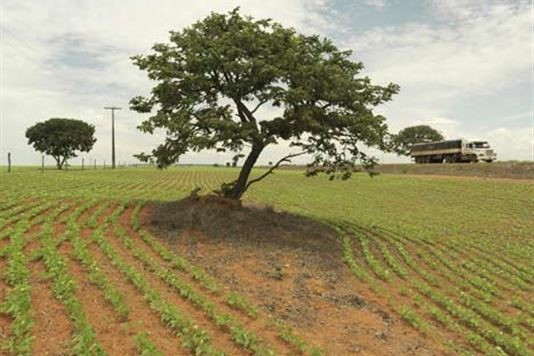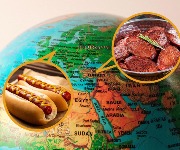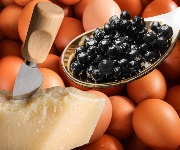The healthiest way to save the planet

Want to be healthy, reduce your climate footprint, and save money? Then the WWF’s ‘LiveWell for LIFE’ diet is for you. Here Sarah Halevy, from the WWF, explains why we should all be on it.
Change your ways
‘Fruit lowers the risk of developing type 2 diabetes’; ‘fruit juice can increase your risk of diabetes’; ‘red meat contains vital vitamins and nutrients’, ‘processed meat increases the risk of dying young’… hardly a day goes by without a new piece of (sometimes distorted) research hitting the headlines.
And that’s not all! These days shoppers are also confronted with moral and ethical choices – should you buy Fairtrade? Organic? Local, seasonal, farm assured? All these production methods have their own merits, but it’s hard to know which one should direct your moral compass.
It doesn’t have to be so complicated. LiveWell, a programme run by environmental organisation WWF, advocates a much simpler solution: changing the way we eat is the most straightforward and effective way to make a positive impact on our health and the environment. There’s no labelling you need to understand, and there’s no price premium.
Greenhouse emissions
By eating food with a lower environmental impact in terms of greenhouse gas emissions (such as plant cereals and pulses), you can stay healthy and help reduce greenhouse gas emissions from the food supply chain by 25% - that is, according to the research we commissioned for our ‘LiveWell Plates’ tool.
WWF UK has analysed the way people in the UK, France, Spain and Sweden eat, and compared this to existing nutritional requirements in each country. The results have been illustrated in a set of LiveWell Plates: visual presentations of a healthy and sustainable diet. The LiveWell Plate shows how small changes to our diet, such as eating more vegetables and less meat, can make a big impact on the environment and our health. You can find more information on the WWF’s LiveWell Plates in our report, ‘A balance of healthy and sustainable food choices for France, Spain and Sweden’.
Three-planet living
If the world’s population consumed key resources in the same way as the average European, we would need 2.7 planets to sustain us. But we only have one planet and its natural resources are depleting fast. The way we grow, produce, eat and waste our food contributes substantially to climate change and the current obesity pandemic.
Our Western appetite for meat and foods high in fat, sugar and salt has been adopted by many people in developed countries, and increasingly so in developing countries. But it’s a recent phenomenon, which has coincided with a growth in problems such as obesity, type 2 diabetes and heart disease.
Worldwide, obesity has nearly doubled since 1980 and has now surpassed the number of underweight. Whereas almost 870 million people are chronically malnourished, 1.5 billion people are overweight – of these more than 40 million are children under the age of five. Obesity is today the fifth leading killer globally, and more and more money is spent on trying to reverse this trend. In the EU, the estimated costs associated with being overweight or obese vary from 1-5% of national health care budgets.
Giant food footprint
But this meat-sweet diet is not only damaging our health; it’s also creating one giant food footprint that’s damaging the planet.
The average person in the EU eats 400% more chicken and 80% more pork today than in the early 1960s. This exponential increase has a massive impact on the environment: producing 1kg of chicken and pork can cause 20 and 31 times more carbon dioxide emissions respectively compared to producing 1kg of potatoes. In fact, in Europe almost a third of all greenhouse gases associated with consumption are food related.
Keeping livestock for meat and dairy uses large amounts of land, energy and water; and converting plant material into animal material is very resource-intensive. While a hectare of land can produce up to 155kg of wheat and as much as 400kg of soya, it will only produce on average 20kg of beef.
And this doesn’t take into consideration the effect agriculture has on biodiversity loss, land-use and deforestation. Crops used for animal feed – such as soybeans – are one of the principal causes of biodiversity loss. The European grassland butterfly population, for instance, has declined by almost 70% since 1990 – and there are no signs of this levelling off.
Wasteful nation
And it’s not just what we eat, but what we throw away as well. It’s widely accepted that we chuck away a third of all food produced. The bread and other cereal products thrown away in UK households alone is enough to lift 30 million of the world's hungry people out of malnourishment.
It’s clear that we need to reverse the current consumption patterns; our waistlines, pockets and environment cannot sustain this for much longer. Many of us are blessed with the freedom to choose what we buy, what we eat and what we throw away. So, let’s eat our way to a sustainable future.
The LiveWell diet
It’s not a radical proposal – our diet contains meat or fish every day, and allows everything from chicken curry to macaroni cheese, as well as crisps and chocolate. And for some it might even be cheaper; research has shown that an average weekly shop in the UK can be reduced by almost £4 per person, if that individual is following the LiveWell diet (which is compiled by nutritionists and alongside the Rowett Institute of Nutrition and Health).
The five principles are: eat more plants; eat a variety of foods; waste less food; moderate your meat consumption, both red and white; buy food that meets a credible certified standard; eat fewer foods high in fat, salt and sugar. Have a look at our 7-day menu here; our shopping list for a family of four here; and suggested recipes written by top chefs here. They’ve all been carefully calculated to follow the government guidelines for a healthy diet while reducing your greenhouse gas emissions to help meet our 2020 targets.
You might also like
Most Recent
Comments
Be the first to comment
Do you want to comment on this article? You need to be signed in for this feature








